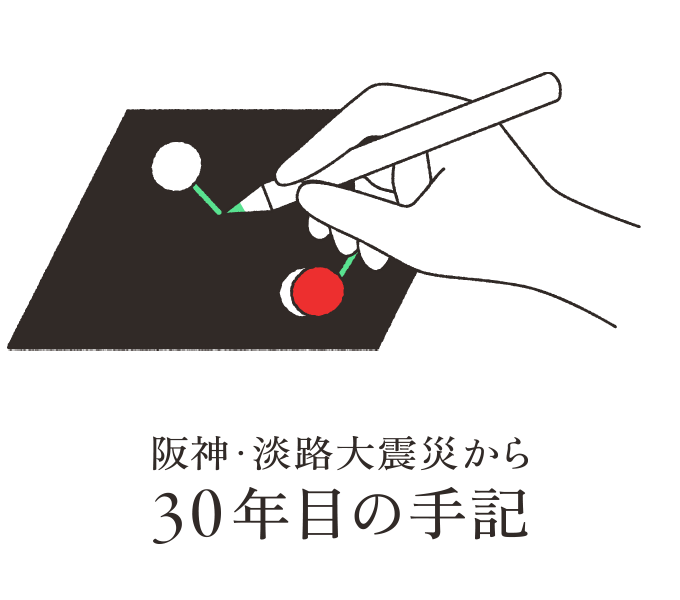それは1月の、暗くて凍りつくような朝だった。私は日本の古い2階建て文化住宅に住んでいて、分厚い布団の中で丸まっていた。たちの悪い長引く風邪を患っており、その日は1日、寝て安静にしていようと思っていた。傍に「強」にした石油ストーブを置いて冷え切った空気を暖めていた。横向きに寝転がり、鼻を詰まらせながら、ウトウトと眠るでもなく起きるでもない状態を繰り返していた。その時……
ものすごい轟音が寝室を走った。耳をつんざくような音に衝撃を受け、目覚めた私に、まるで怪物ように地震が襲いかかり、私は布団から畳に放り出された。何とか体勢を立て直そうとしたが、地震は攻撃を緩めず、私は地面に叩きつけられた。私の家は上下左右に飛び跳ねて、私はまるで子どもの遊具の「ジャンピングハウス」に閉じ込められてしまったかのようだった。
しばらくして地震は収まり、揺れが小さくなった。やっと脱出のチャンスが来たと思った。
布団から階段の上まで飛び出し、真っ暗な中、両手を狭い階段の両側にしっかりと押さえながら1階へと降りて行った。その途中で何の前触れもなく、再び地震が襲った。今回は全てのものが横倒しになった。私は最悪の事態を予測して目を閉じたが、地震は収まり、階段は無事で私は死を免れた。
私は階段を駆け下り、散乱した家具につまずき、よろめきながら玄関に続くガラスの引き戸に向った。戸を開けようとしたが、引っかかって開かない。必死のあまりに、私はガラスを蹴り開け、外側の木の扉をぶち破り、通りに飛び出した。
余震で電柱が揺れる中、私は手で体のあちこちを、怪我はないか確認しながら走った。奇跡的にも私は大丈夫だった。私は真冬の冷たく暗い通りに、裸足にパジャマ姿でいたが、無事だったのだ。
私の隣人であり友人でもある、ヴィクトリア出身のカナダ人が隣から現れ、私たちは抱き合った。彼は、私たちの裏の文化住宅が倒壊したと伝えてくれた。そして彼が救助のために駆け出し、私もその後に続いた。数秒後、3軒向こう家屋の中から悲鳴が聞こえた。カルガリーから来た若いカナダ人カップルが脱出できずにいた。私は玄関の扉をぶち壊し、2人を助けた。母親は泣いている赤ちゃんを抱いており、夫はすぐ後ろにいた。震えていたが、怪我はなかった。
私はその日の残りの時間を、近隣の人々の救助のために費やした。気がつくと私は、倒壊して材木や金属やガラスなどの瓦礫の山となってしまった文化住宅の上でバランスを取りながら、素手で瓦礫を掘って生存者を救出していた。立っている足の下の方から、叫び声、泣き声、怒号や苛立ちの声が聞こえてきた。私は閉じ込められた人に、私は決して彼らから離れないと言って安心させた。私は1人の日本人青年を助けたが、残念ながら彼の両親は駄目だった。
負傷した友人を歩いて病院も連れて行った。救命救急センターは大混乱で、被災した人々が、生きている人も亡くなっている人も、救急車やタクシーや自家用車で次々と運ばれてきていた。看護師たちが遺体にシーツを被せて、壁際の床から天井に積み上げていっていた。私も看護師を手伝い2人の遺体を運んだ。彼女は感謝してくれていたが、監督者が来て、「これは看護師の仕事でありあなたの仕事ではないので、あなたは負傷した友人に付き添っているべきだ」と言って、私が手伝うことを止めた。
翌朝、私はリュックに荷物を詰め、阪急西宮駅に向かって何千人もの同じ境遇の被害者たちと歩いて行った。私たちは共に、何時間も無言で歩いていた。皆ショックで傷つき、人生が全く変わってしまったと感じていた。ただ、命あることには感謝していた。
A dark, chilly January morning. Curled up in a ball under my thick futon on the second floor of my Japanese bunka-jutaku – a traditional two-story row house. I had a nasty, lingering cold and planned to spend the day sleeping it off. Nearby, the kerosene heater turned on high to warm the frigid air. I laid on my side, stuffed-up nose, drifting in and out of sleep, when…
A shattering roar ripped through my bedroom. The deafening noise shocked me awake and the earthquake, like a monstrous attack, tossed me out of my futon on to the surrounding Japanese tatami mats. I tried to push myself up, but the earthquake’s ongoing assault threw me to the ground. My home jumped up and down, side to side, like I was stuck in a children’s “bouncing castle.”
Moments later, the earthquake withdrew, only rattling tremors now, and I saw my chance to escape.
From my futon, I leaped to the top of the steep stairs, and in pitch black, pressed my hands on either side of the narrow staircase and made my way to the ground floor. Half-way down the stairs, without warning, the earthquake erupted. This time, everything fell sideways. I closed my eyes expecting the worst, but the earthquake retreated, the staircase held, and death gave me a pass.
I raced down the stairs, tripped over scattered furniture, and stumbled to the sliding glass doors leading to the entrance. As I pulled on the doors, I discovered they were stuck. In desperation, I kicked open the glass doors, broke through the outer wooden door, and ran out into the street.
With telephone poles swaying around me from the aftershocks, I ran my hands up and down my body, checking for cuts and wounds. Miraculously, I was fine. On a cold dark street in winter in my bare feet and pajamas, but safe.
My neighbor and friend, a fellow Canadian from Victoria, appeared from next door and we hugged. He told me the earthquake destroyed the bunka-jutaku behind ours. He sprinted ahead to help, and I followed closely behind. Seconds later, I heard screams from inside a home, three doors down. A young Canadian couple from Calgary, unable to escape. I broke through their front door and guided them to safety. Mother cuddling her crying baby, the husband close behind. Shaken but uninjured.
I spent the rest of the day rescuing neighbors. Balancing on top of the destroyed bunka-jutaku – an enormous pile of wood, steel, and glass – and digging out survivors with my bare hands. Shouts, cries, anger, and frustration called from below as I stood on top, reassuring them I would not leave. I saved one young Japanese man, but sadly his parents did not make it.
I walked an injured friend to a local hospital. The Emergency Room was in chaos, with the victims – alive and dead – arriving by ambulance, taxi, and car. Nurses covered corpses in sheets and stacked them against the wall, from floor to ceiling. I helped a nurse carry two of the bodies. She was grateful, but a supervisor stopped me and said it was fine, this was their job, not mine, and I should stay with my friend.
The next morning, I filled my backpack and walked to the Hankyu Nishinomiya train station, along with thousands of fellow earthquake survivors. Together, we walked for hours in silence. Shocked and broken, our lives forever changed, but grateful to be alive.
(翻訳:ティム・レモン Tim LEMON)
タイトル
あるカナダ人の震災体験 / A Canadian Perspective of the Earthquake
投稿者
レスター・M・パトリック / Lester M. Patrick
年齢
64歳
1995年の居住地
神戸市灘区
手記を書いた理由
あの震災は、人生を変えてしまう経験だった。私は全てを失ってしまったのだ。しかし、友人や職場の雇い主の援助のお陰で、大阪に転居し、2007年まで日本で働き続けることができた。あの地震は恐ろしく悲惨な経験であり、想像を絶する規模の惨状を目の当たりにした。1つの明るい出来事は、大阪に拠点を移したことが、妻との出会いに繋がったことである。当時彼女は大阪で看護師として働いていた。
私はこの体験談を、あの困難な時期を乗り切るために私を助けてくださった多くの方々に、そして何よりも、日本人のがんばる力に捧げたい。日本人は計り知れない死と喪失に直面しながらも、自分たちの生活やコミュニティの再建に向けて前進し続けたのだ。兵庫県そして神戸は、私の心の中の特別な、そして大切な場所に、これからもずっとあり続ける。
The earthquake was a lifechanging experience. I lost everything during the earthquake, but thanks to the help of my friends and my employer, I relocated to Osaka Prefecture and continued working in Japan until 2007. The earthquake was a horrific experience, and I saw devastation on a scale I could not imagine possible. One bright note was my relocation led to meeting my current wife who was working as nurse in Osaka Prefecture.
I want to dedicate my story to the many people who helped me through this difficult time, and most of all to the resilience of the Japanese people who were faced with such tremendous death and loss but continued to move forward and rebuild their lives and their communities. Kobe and Hyogo Prefecture will always hold a very special and precious place in my heart.
